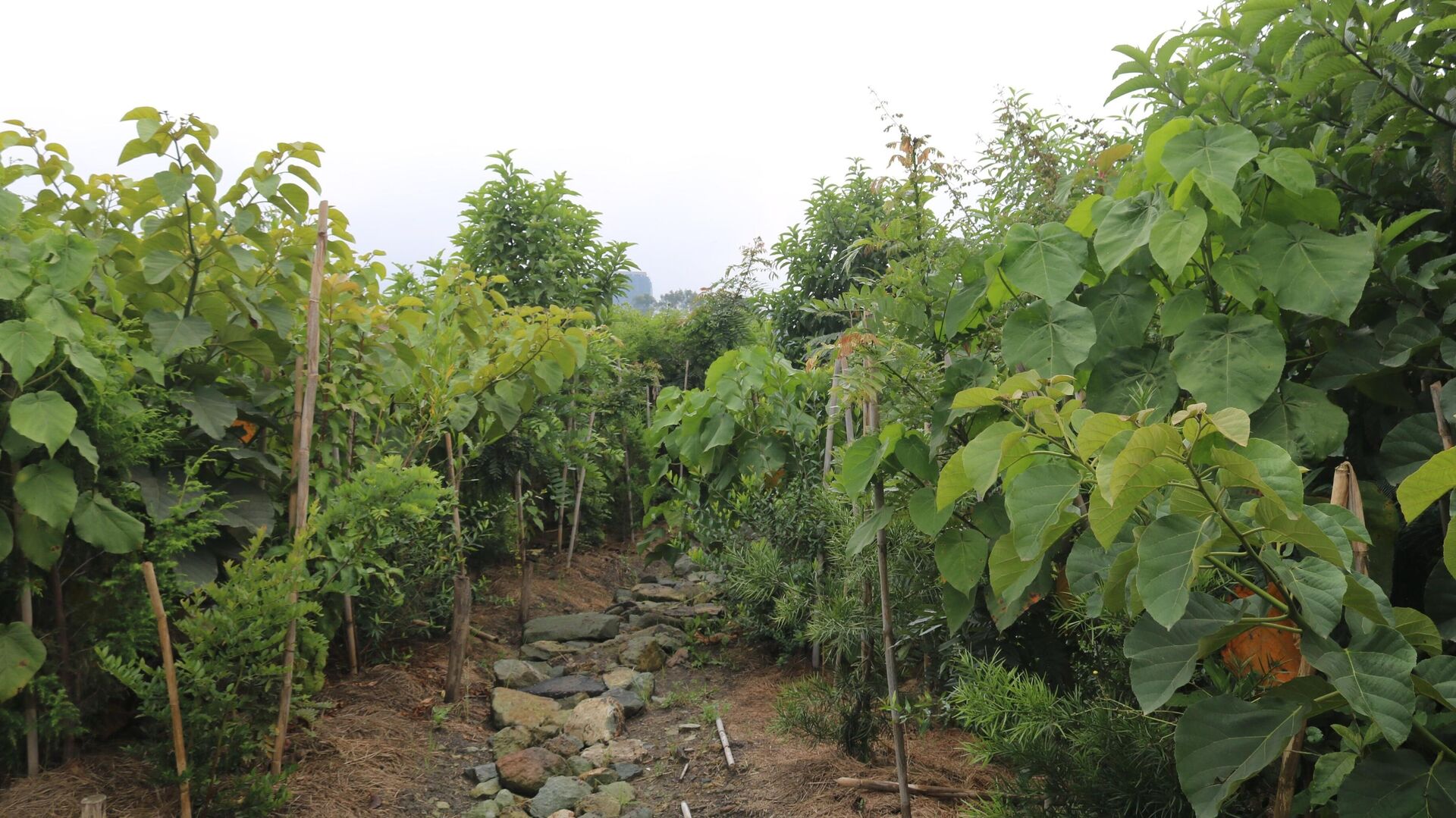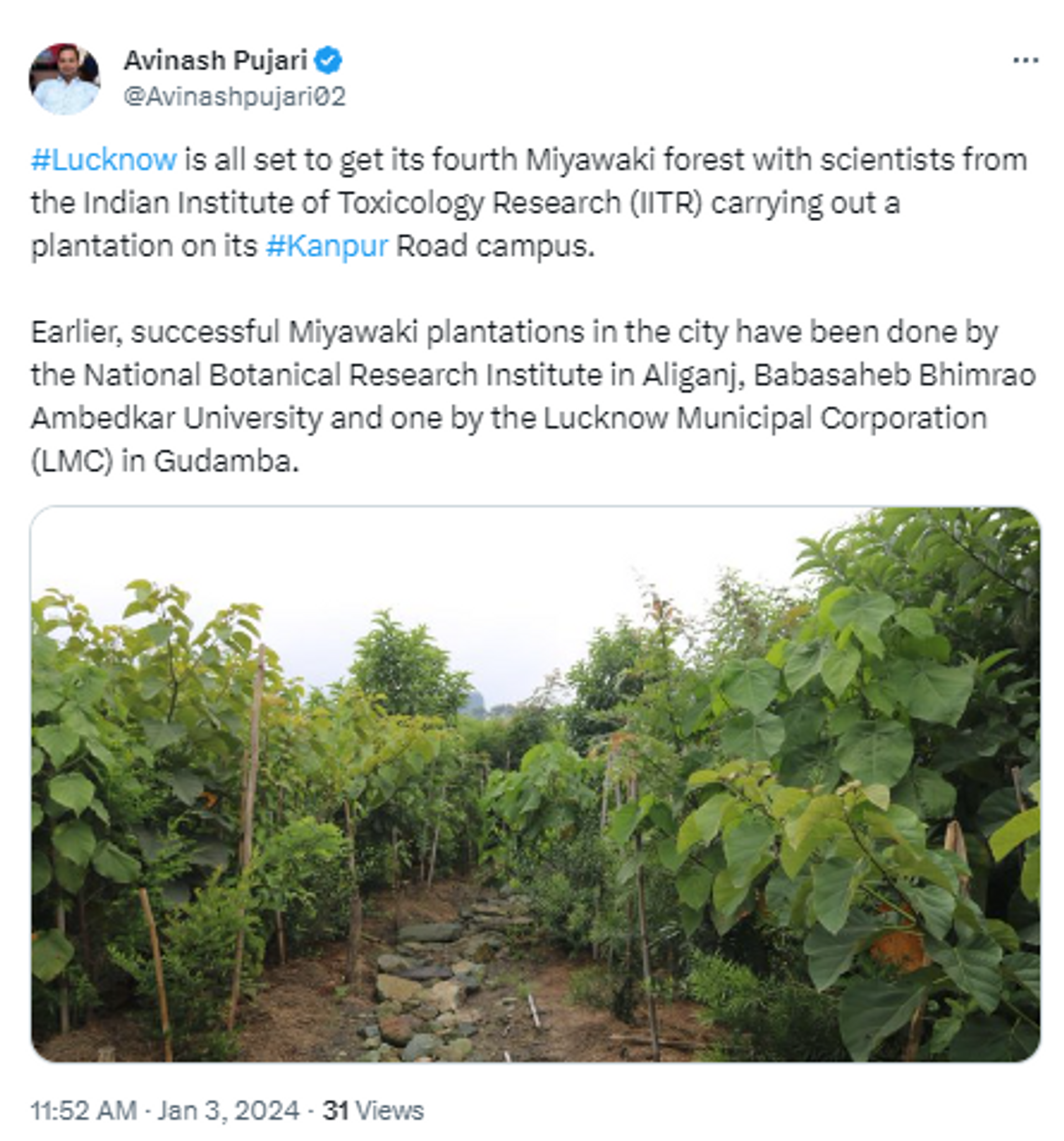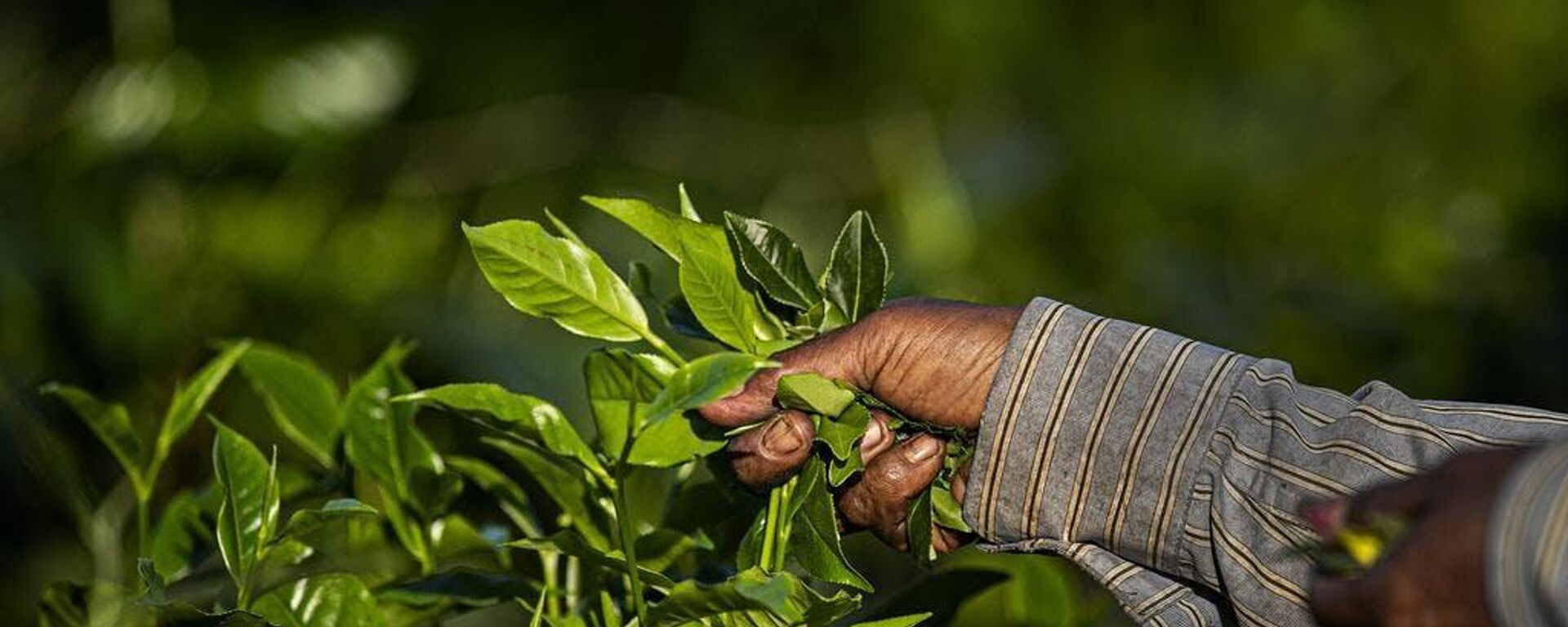https://sputniknews.in/20240103/lucknow-launches-fourth-urban-reforestation-project-using-miyawaki-technique-6069799.html
Lucknow Launches Fourth Urban Reforestation Project Using 'Miyawaki' Technique
Lucknow Launches Fourth Urban Reforestation Project Using 'Miyawaki' Technique
Sputnik India
The Miyawaki plantation method is gaining popularity in Uttar Pradesh for its effectiveness in creating dense forests on degraded land previously used for agriculture or construction.
2024-01-03T15:06+0530
2024-01-03T15:06+0530
2024-01-03T15:07+0530
india
uttar pradesh
climate change
environment
environmental crisis
agriculture
indian farmers
science & tech
japan
wildlife
https://cdn1.img.sputniknews.in/img/07e8/01/03/6072164_42:0:3683:2048_1920x0_80_0_0_e01b871fc3544f85c10f9dd6e8f09afd.jpg
Scientists at the Council of Scientific and Industrial Research - Indian Institute of Toxicology Research (CSIR-IITR) in Lucknow have successfully launched their fourth Miyawaki forest on the Kanpur Road campus.The Miyawaki plantation method is highly successful around the world because it follows the principles of natural reforestation, using native trees and replicating the processes of natural forest regeneration.Named after the Japanese botanist Akira Miyawaki, the method was developed in the 1970s to densify green cover on a small area of land. The process involves planting two to four species of native trees per square metre.Ravi Kumar Singh, an Indian Forest Service officer in Lucknow's Awadh division, said the fourth Miyawaki forest, covering 100 square metres, will have 1,000 plantations, including sandalwood, rudraksh (basil), amla, mango, guava, jamun and kathal. There will also be medicinal plants such as Tulsi, Aloe Vera, Lemongrass, Giloy, Methi and Sweet Neem.He said the Miyawaki method offers significant advantages over traditional forestry, especially for smaller reforestation projects, and is particularly effective in urban environments.In addition to the Kanpur Road Campus, Miyawaki plantations have been successfully established by the National Botanical Research Institute in Aliganj, Babasaheb Bhimrao Ambedkar University and the Lucknow Municipal Corporation (LMC) in Gudamba.According to Ashish Tiwari, Secretary, Ministry of Environment, Forests and Climate Change, Miyawaki forests have higher biodiversity than surrounding areas and are an ideal method for creating diverse forest ecosystems.Tiwari said that in today's climate emergency and with repeated warnings of global biodiversity loss, the creation of such a diverse forest through Miyawaki Forest could be a game changer.
https://sputniknews.in/20230916/revolutionary-indian-technology-transforms-tea-waste-into-valuable-components--4283718.html
india
uttar pradesh
japan
Sputnik India
feedback.hindi@sputniknews.com
+74956456601
MIA „Rossiya Segodnya“
2024
Sangeeta Yadav
https://cdn1.img.sputniknews.in/img/07e6/0c/0f/110602_0:0:641:640_100x100_80_0_0_c298016a79eb02ef8caa9d1f688c12a5.jpg
Sangeeta Yadav
https://cdn1.img.sputniknews.in/img/07e6/0c/0f/110602_0:0:641:640_100x100_80_0_0_c298016a79eb02ef8caa9d1f688c12a5.jpg
News
en_IN
Sputnik India
feedback.hindi@sputniknews.com
+74956456601
MIA „Rossiya Segodnya“
Sputnik India
feedback.hindi@sputniknews.com
+74956456601
MIA „Rossiya Segodnya“
Sangeeta Yadav
https://cdn1.img.sputniknews.in/img/07e6/0c/0f/110602_0:0:641:640_100x100_80_0_0_c298016a79eb02ef8caa9d1f688c12a5.jpg
miyawaki plantation method, uttar pradesh, dense forests, agriculture, council of scientific and industrial research - indian institute of toxicology research (csir-iitr), miyawaki, reforestation, natural forest regeneration, japanese botanist akira miyawaki, green cover, ravi kumar singh, indian forest service officer, awadh division, plantation, sandalwood, rudraksh (basil), amla, mango, guava, jamun, kathal, medicinal plant, tulsi, aloe vera, lemongrass, giloy, methi, sweet neem, traditional forestry, afforestation projects, urban environments, national botanical research institute, aliganj, babasaheb bhimrao ambedkar university, lucknow municipal corporation (lmc), ashish tiwari, department of environment, forest and climate change, biodiversity, forest ecosystems, climate change emergency,
miyawaki plantation method, uttar pradesh, dense forests, agriculture, council of scientific and industrial research - indian institute of toxicology research (csir-iitr), miyawaki, reforestation, natural forest regeneration, japanese botanist akira miyawaki, green cover, ravi kumar singh, indian forest service officer, awadh division, plantation, sandalwood, rudraksh (basil), amla, mango, guava, jamun, kathal, medicinal plant, tulsi, aloe vera, lemongrass, giloy, methi, sweet neem, traditional forestry, afforestation projects, urban environments, national botanical research institute, aliganj, babasaheb bhimrao ambedkar university, lucknow municipal corporation (lmc), ashish tiwari, department of environment, forest and climate change, biodiversity, forest ecosystems, climate change emergency,
Lucknow Launches Fourth Urban Reforestation Project Using 'Miyawaki' Technique
15:06 03.01.2024 (Updated: 15:07 03.01.2024) The Miyawaki plantation method is gaining popularity in the Indian state of Uttar Pradesh for its effectiveness in creating dense forests on damaged land previously used for agriculture or construction.
Scientists at the Council of Scientific and Industrial Research - Indian Institute of Toxicology Research (CSIR-IITR) in Lucknow have successfully launched their fourth Miyawaki forest on the Kanpur Road campus.
The Miyawaki plantation method is highly successful around the world because it follows the principles of natural reforestation, using native trees and replicating the processes of natural forest regeneration.
Named after the Japanese botanist Akira Miyawaki, the method was developed in the 1970s to densify green cover on a small area of land. The process involves planting two to four species of native trees per square metre.
Ravi Kumar Singh, an Indian Forest Service officer in Lucknow's Awadh division, said the fourth Miyawaki forest, covering
100 square metres, will have 1,000 plantations, including sandalwood, rudraksh (basil), amla, mango, guava, jamun and kathal. There will also be medicinal plants such as Tulsi, Aloe Vera, Lemongrass, Giloy, Methi and Sweet Neem.
He said the Miyawaki method offers significant advantages over traditional forestry, especially for smaller reforestation projects, and is particularly effective in urban environments.
In addition to the Kanpur Road Campus, Miyawaki plantations have been successfully established by the National Botanical Research Institute in Aliganj, Babasaheb Bhimrao Ambedkar University and the Lucknow Municipal Corporation (LMC) in Gudamba.
According to Ashish Tiwari, Secretary, Ministry of Environment, Forests and Climate Change, Miyawaki forests have higher biodiversity than surrounding areas and are an ideal method for creating diverse forest ecosystems.
Tiwari said that in today's climate emergency and with repeated warnings of global biodiversity loss, the creation of such a diverse forest through Miyawaki Forest could be a game changer.




